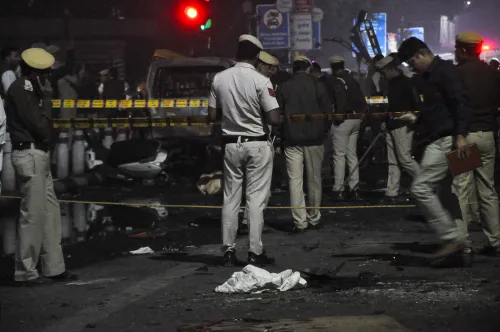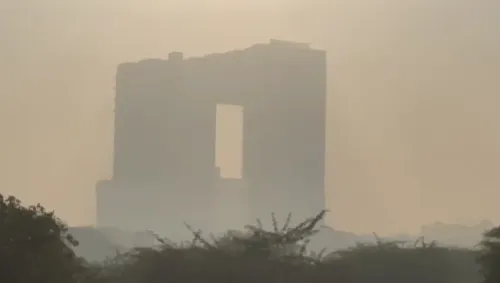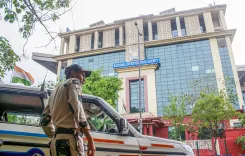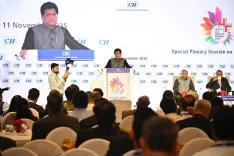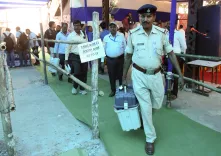Is Fadnavis' Labeling of Rahul Gandhi as ‘Urban Naxal’ Justified?
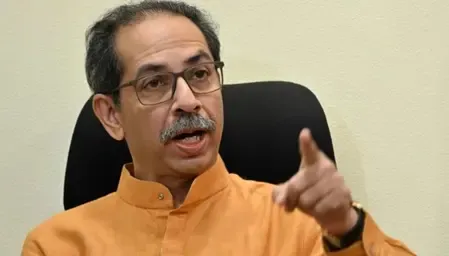
Synopsis
Key Takeaways
- Fadnavis' remarks reflect a troubling trend of suppressing dissent.
- Concerns for democracy are paramount under the current administration.
- Foreign policy aligns with controversial ideologies.
- Intimidation tactics are being used against dissenters.
- Public outrage is growing due to wealth concentration.
Mumbai, Sep 22 (NationPress) The Shiv Sena (UBT) took aim at Maharashtra's Chief Minister Devendra Fadnavis on Monday for labeling Rahul Gandhi as an “Urban Naxal,” accusing him of speaking in a confused manner and using such terms to suppress dissent.
In an editorial published in the party's mouthpiece, Saamana, the Thackeray faction stated that Fadnavis’ comments followed Gandhi's allegations regarding the corruption and vote manipulation in the electoral system, referencing the youth of Nepal who rose against a corrupt regime to protect democracy.
“Fadnavis' remarks clearly indicate a confused mindset. If Gandhi is labeled an urban Naxal, what then can be said about India's current foreign policy which appears to lean towards 'Maoism'?” posed the Thackeray camp in the editorial.
The Shiv Sena (UBT) expressed deep concern regarding the threats to the Constitution and democracy under the BJP-led administration at the Center, claiming that dissenters are categorized as 'urban Naxals', instilling fear and preventing individuals from speaking out.
The editorial criticized the BJP, Modi, and Fadnavis, stating that none of them were part of the freedom struggle. “Had they participated, they would have labeled the Quit India movement and the Non-Cooperation Movement as 'Urban Naxal' campaigns,” it quipped.
“Mao's country is China, where his influence persists. If it’s true that China adheres to Mao's ideologies, then why is Prime Minister Modi collaborating with Mao’s China after President Trump’s criticisms? Will Modi also label Foreign Minister Jaishankar a Maoist and urban Naxal for engaging with China?” questioned the Thackeray camp.
“Mao's China is now considered an ally of India, and BJP’s foreign policy experts are praising China incessantly. While other communist regimes have fallen globally, China’s regime remains intact. Corrupt ministers vanish there, and electoral fraud is not tolerated. Revolutionary ideologies are instilled in Maoists, and when these revolutionaries resort to arms, they become Naxalites,” stated the Thackeray camp.
According to the editorial, farmers from Haryana, Punjab, and Uttar Pradesh protested for their rights, enduring severe weather conditions at the Delhi border to demand the repeal of four controversial laws. “Thousands of farmers lost their lives during this struggle. The BJP had claimed at that time that terrorists and Naxalites infiltrated the movement. Thus, it is hardly surprising that Fadnavis is labeling the protest against vote theft as an urban Naxal movement,” mocked the Thackeray camp.
The editorial further asserted, “Mao believed that a country’s wealth should not be concentrated in the hands of a single person or group. Yet today, in India, the nation’s resources are held by a couple of corporate entities. Prime Minister Modi is also funneling public wealth into the coffers of these elites. Chief Minister Fadnavis himself has handed over Maharashtra's forest resources, mines, and land in Mumbai to a select few connected to the BJP. The public is outraged. When they rise against this, they are silenced with cries of 'Mao' and 'Urban Naxal',” claimed the editorial.
The Thackeray camp noted that the BJP exploited the emergency imposed by Indira Gandhi to target opposition leaders. “However, they forget that figures like Charan Singh and Jayaprakash Narayan urged police and military not to comply with governmental commands. George Fernandes, a staunch opponent of the emergency, was linked to the Baroda dynamite case. Should all of them also be branded as 'Urban Naxals'?” it queried.
The Thackeray camp asserted that the ruling class's fear of a youth rebellion in India, akin to that in Nepal, is evident. Consequently, the government resorts to intimidation and threats. But the crucial question remains: has this regime grown more fearful of the populace than the populace is of the government?”

